八年级上册英语第一课
- 格式:doc
- 大小:91.00 KB
- 文档页数:13
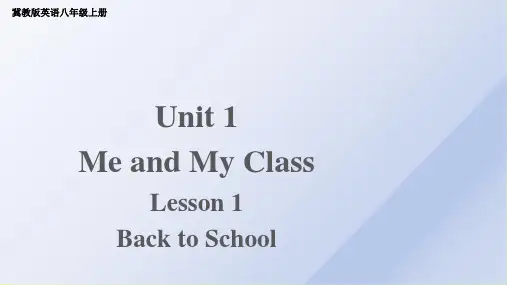
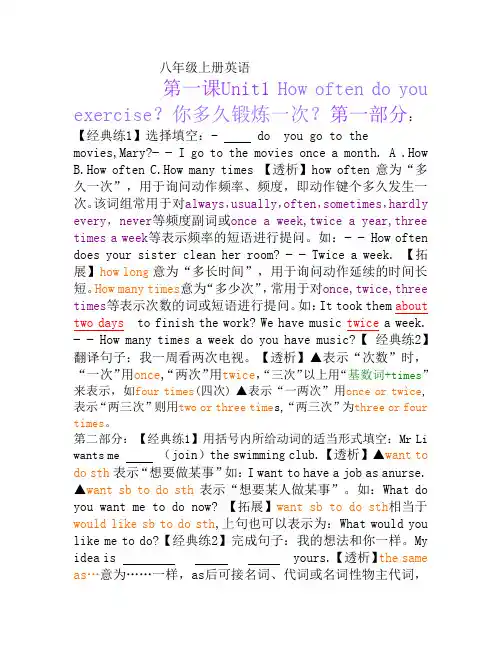
八年级上册英语第一课Unit1 How often do you exercise?你多久锻炼一次?第一部分:【经典练1】选择填空:- do you go to themovies,Mary?——I go to the movies once a month. A .How B.How often C.How many times 【透析】how often 意为“多久一次”,用于询问动作频率、频度,即动作键个多久发生一次。
该词组常用于对always,usually,often,sometimes,hardly every,never等频度副词或once a week,twice a year,three times a week等表示频率的短语进行提问。
如:——How often does your sister clean her room? ——Twice a week. 【拓展】how long意为“多长时间”,用于询问动作延续的时间长短。
How many times意为“多少次”,常用于对once,twice,three times等表示次数的词或短语进行提问。
如:It took them about two days to finish the work? We have music twice a week. ——How many times a week do you have music?【经典练2】翻译句子:我一周看两次电视。
【透析】▲表示“次数”时,“一次”用once,“两次”用twice,“三次”以上用“基数词+times”来表示,如four times(四次) ▲表示“一两次”用once or twice,表示“两三次”则用two or three time s,“两三次”为three or four times。
第二部分:【经典练1】用括号内所给动词的适当形式填空:Mr Li wants me(join)the swimming club.【透析】▲want to do sth表示“想要做某事”如:I want to have a job as anurse.▲want sb to do sth 表示“想要某人做某事”。
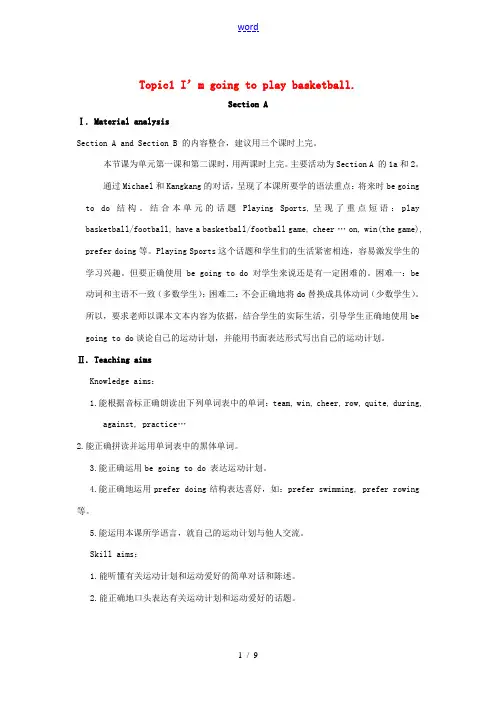
Topic1 I’m going to play basketball.Section AⅠ. Material analysisSection A and Section B 的内容整合,建议用三个课时上完。
本节课为单元第一课和第二课时,用两课时上完。
主要活动为Section A 的1a和2。
通过Michael和Kangkang的对话,呈现了本课所要学的语法重点:将来时be going to do结构。
结合本单元的话题Playing Sports,呈现了重点短语:play basketball/football, have a basketball/football game, cheer …on, win(the game), prefer doing等。
Playing Sports这个话题和学生们的生活紧密相连,容易激发学生的学习兴趣。
但要正确使用be going to do对学生来说还是有一定困难的。
困难一:be 动词和主语不一致(多数学生);困难二:不会正确地将do替换成具体动词(少数学生)。
所以,要求老师以课本文本内容为依据,结合学生的实际生活,引导学生正确地使用be going to do谈论自己的运动计划,并能用书面表达形式写出自己的运动计划。
Ⅱ. Teaching aimsKnowledge aims:1.能根据音标正确朗读出下列单词表中的单词:team, win, cheer, row, quite, during,against, practice…2.能正确拼读并运用单词表中的黑体单词。
3.能正确运用be going to do 表达运动计划。
4.能正确地运用prefer doing结构表达喜好,如:prefer swimming, prefer rowing 等。
5.能运用本课所学语言,就自己的运动计划与他人交流。
Skill aims:1.能听懂有关运动计划和运动爱好的简单对话和陈述。
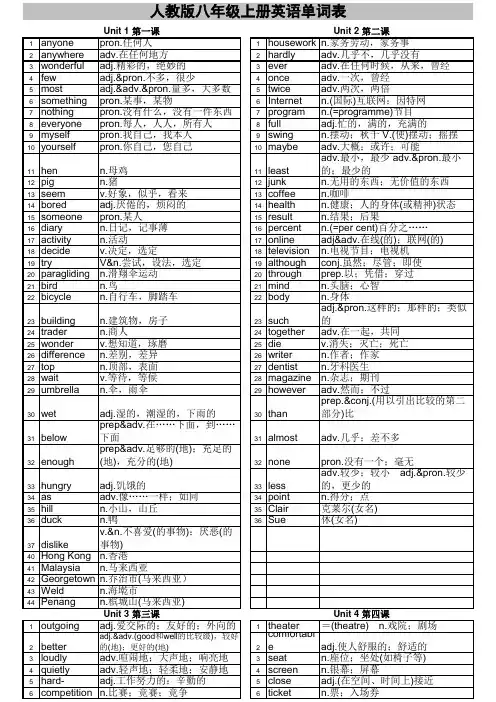
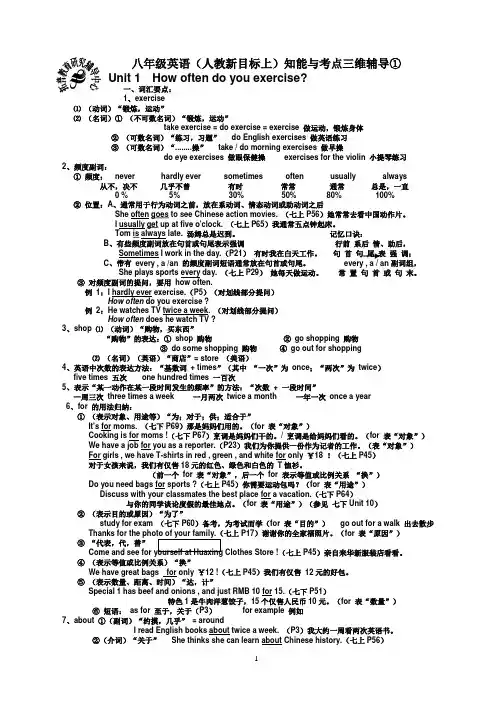
八年级英语(人教新目标上)知能与考点三维辅导①Unit 1 How often do you exercise?一、词汇要点:1、exercise⑪(动词)“锻炼,运动”⑫(名词)①(不可数名词)“锻炼,运动”take exercise = do exercise = exercise 做运动,锻炼身体②(可数名词)“练习,习题”do English exercises 做英语练习③(可数名词)“........操”take / do morning exercises 做早操do eye exercises 做眼保健操exercises for the violin 小提琴练习2、频度副词:①频度:never hardly ever sometimes often usually always从不,决不几乎不曾有时常常通常总是,一直0 % 5% 30% 50% 80% 100%②位置:A、通常用于行为动词之前,放在系动词、情态动词或助动词之后She often goes to see Chinese action movies. (七上P56)她常常去看中国动作片。
I usually get up at five o'clock. (七上P65)我通常五点钟起床。
Tom is always late. 汤姆总是迟到。
记忆口诀:B、有些频度副词放在句首或句尾表示强调行前系后情、助后,Sometimes I work in the day.(P21)有时我在白天工作。
句首句尾表强调;C、带有every , a /an 的频度副词短语通常放在句首或句尾。
every , a / an副词组,She plays sports every day. (七上P29)她每天做运动。
常置句首或句末。
③对频度副词的提问,要用how often.例1:I hardly ever exercise.(P5)(对划线部分提问)How often do you exercise ?例2:He watches TV twice a week. (对划线部分提问)How often does he watch TV ?3、shop ⑪(动词)“购物,买东西”“购物”的表达:①shop 购物②go shopping 购物③do some shopping 购物④go out for shopping⑫(名词)(英语)“商店”= store (美语)4、英语中次数的表达方法:“基数词+ times”(其中“一次”为once;“两次”为twice)five times 五次one hundred times 一百次5、表示“某一动作在某一段时间发生的频率”的方法:“次数+ 一段时间”一周三次three times a week 一月两次twice a month 一年一次once a year6、for 的用法归纳:①(表示对象、用途等)“为;对于;供;适合于”It's for moms. (七下P69)那是妈妈们用的。

八年级l上册英语第一课知识点八年级上册英语第一课知识点八年级上册英语第一课的名字叫做 Welcome back to school,是一节介绍如何欢迎新学期的课程。
下面我们来总结一下这节课的知识点。
1. 问好和介绍自己遇见新同学和老师,需要问好并介绍自己。
可以用像“Hello, my name is…”或者“Nice to meet you.”这样的句型。
2. 谈论课程表在新学期,课程表通常有所变化,需要谈论课程表,并列出上课时间和地点。
可以用像“What classes do you have today?”或者“Do you have English in the afternoon?”这样的问句。
3. 谈论活动学校通常会在新学期组织各种各样的活动,需要谈论这些活动,并决定哪些活动值得参加,或者自己想参加的活动。
可以用像“Have you heard about the school dance?”或者“I want to do some volunteering this semester.”这样的句型。
4. 谈论成绩新学期开始,老师通常会公布上学期的成绩,需要谈论自己的成绩并决定如何提高自己的成绩。
可以用像“Have you seen your grade yet?”或者“Do you have any tips on studying for tests?”这样的问句。
5. 谈论目标新学期开始,有时候会设立一些学习目标,需要谈论自己的目标,并确定如何完成这些目标。
可以用像“My goal is to improvemy English speaking skills.”或者“Do you have any suggestions for achie ving my goal?”这样的句型。
以上就是八年级上册英语第一课的知识点。
希望大家在新的学期里能够取得更好的成绩!。

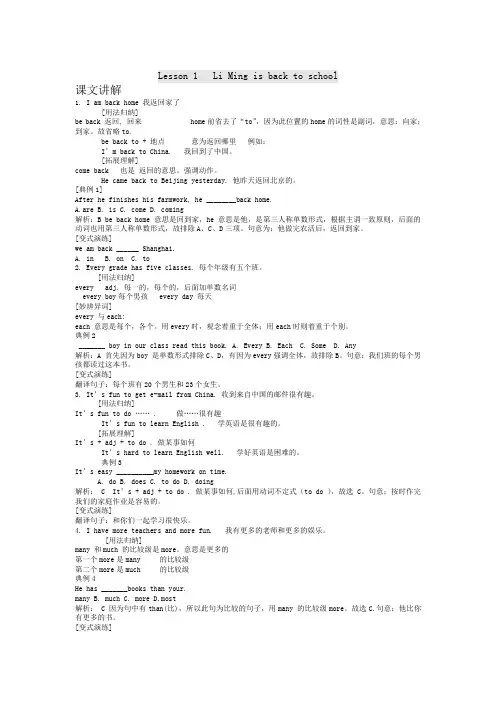
Lesson 1 Li Ming is back to school课文讲解1. I am back home 我返回家了[用法归纳]be back 返回, 回来 home前省去了“to”,因为此位置的home的词性是副词,意思:向家;到家。
故省略to.be back to + 地点意为返回哪里例如:I’m back to China. 我回到了中国。
[拓展理解]come back 也是返回的意思。
强调动作。
He came back to Beijing yesterday. 他昨天返回北京的。
[典例1]After he finishes his farmwork, he ________back home.A.areB. isC. comeD. coming解析:B be back home 意思是回到家,he 意思是他,是第三人称单数形式,根据主谓一致原则,后面的动词也用第三人称单数形式,故排除A、C、D三项。
句意为:他做完农活后,返回到家。
[变式演练]we am back ______ Shanghai.A. inB. onC. to2. Every grade has five classes. 每个年级有五个班。
[用法归纳]every adj. 每一的,每个的,后面加单数名词every boy每个男孩 every day 每天[妙辨异词]every 与each:each 意思是每个,各个。
用every时,观念着重于全体;用each时则着重于个别。
典例2_______ boy in our class read this book. A. Every B. Each C. Some D. Any解析:A 首先因为boy 是单数形式排除C、D,有因为every强调全体,故排除B。
句意:我们班的每个男孩都读过这本书。
[变式演练]翻译句子:每个班有20个男生和23个女生。
3. It’s fun to get e-mail from China. 收到来自中国的邮件很有趣。
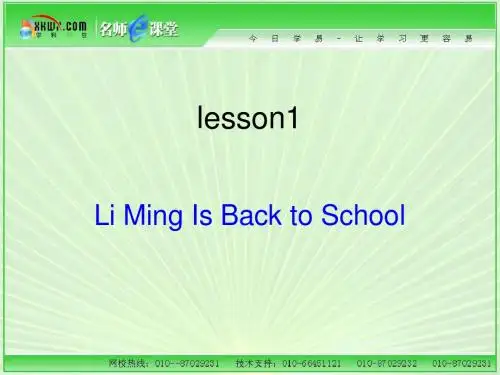
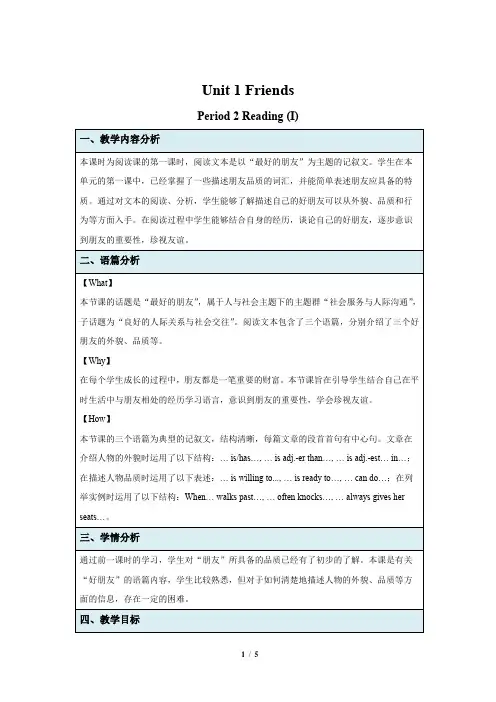
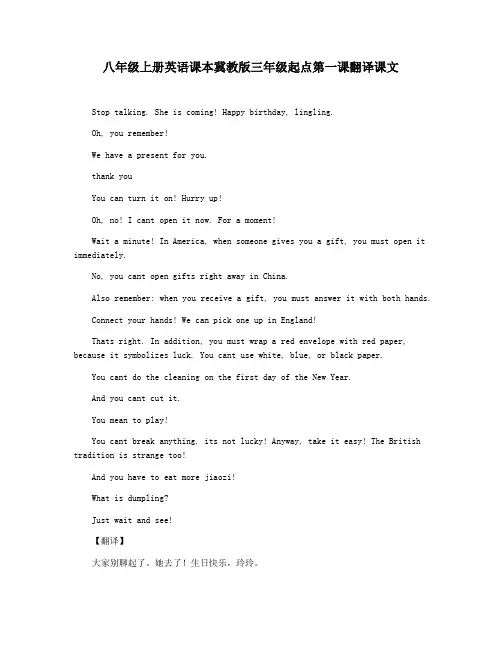
八年级上册英语课本冀教版三年级起点第一课翻译课文Stop talking. She is coming! Happy birthday, lingling.Oh, you remember!We have a present for you.thank youYou can turn it on! Hurry up!Oh, no! I cant open it now. For a moment!Wait a minute! In America, when someone gives you a gift, you must open it immediately.No, you cant open gifts right away in China.Also remember: when you receive a gift, you must answer it with both hands.Connect your hands! We can pick one up in England!Thats right. In addition, you must wrap a red envelope with red paper, because it symbolizes luck. You cant use white, blue, or black paper.You cant do the cleaning on the first day of the New Year.And you cant cut it.You mean to play!You cant break anything, its not lucky! Anyway, take it easy! The British tradition is strange too!And you have to eat more jiaozi!What is dumpling?Just wait and see!【翻译】大家别聊起了。
Section B 1 (1a-2e)一、教学目标:1) 能掌握以下单词:decide, try, paragliding, feel like, bird, bicycle, building, trader, wonder, difference, top, wait, umbrella, wet, because of, below, enough, hungry2) 能掌握以下句型:① Where did…? ② What did…? ③ How was…? / How were…? ④ Did she/he…?二、教学重点1) 掌握本课时出现的生词及表达方式。
2) 进行听力训练,提高综合听说能力。
3)阅读短文,获得相关信息,提高学生们的综合阅读能力。
三、教学难点1. 听力训练2. 阅读2b部分的短文并完成相关要求。
四、教学准备:多媒体PPT五、教学过程Ⅰ. Warming-up and revision1. Daily greeting.2. Check the homework. Let some Ss report where did they go on vacation.3. Review the “复合不定代词”4. Review the “反身代词”5. Learn the new wordsⅡ. MatchingWork on 1a:1. Point to the six words. delicious, expensive, exciting, cheap, terrible, boring2. Read the words and let Ss read after the teacher.3. Point to the last picture and say: This is a cake. It’s delicious. Then do the same thing for all six pictures.4. Let Ss match each word with a picture. Then check the answers with the students.Ⅲ. ListeningWork on 1c:1. T: Now let's work on 1c. First, let one student read thequestions aloud. Make sure all the Ss know the meanings of the questions.2. Play the recording for the first time. Ss only listen.3. Then play the recording for the second time. Ss listen and answer the questions.4. Then play the recording for the third time for the Ss to check the answers.5. Ss listen to the tape and circle the words and phrases theyhear.6. Check the answers: (Look at the big screen.)Work on 1d:1. Tell Ss this time they have to write down what Lisa said about her vacation, the people, the fun park, the food and the store.2. Then play the recording for the second time. Ss listen and write down the words.3. Then play the recording for the third time for the Ss to check the answers.4. Listen again. Complete the conversation.Ⅳ. Pair work1. Tell Ss to ask and answer about Lisa’s vacation. Begin your questions with the following sentences. For example:Where did you go on vacation?I went to New York City.Did you go with anyone?Yes, I did.2. Ss work in pairs and ask and answer about Lisa’s vacations.3. Let some pairs come to the front and ask and answer in pairs. Ⅴ. Discussion1. Tell Ss to work in groups. Discuss the questions together.What do people usually do on vacation?What activities do you find enjoyable?2. Give Ss some possible answers:People usually go to some places of interest for vacation.I find fishing enjoyable.3. Ss discuss the two questions. Write down their answers. Let some group report their answers.4. Leading in 图片展示马来西亚人文风情,为reading做导入。
Unit1Topic3The school sports meet is coming .SectionA说课稿英语组:刘丹丹时间:2013年9月11日尊敬的各位老师:今天我说课的内容是仁爱版英语八年级上册Unit1Topic3The school sports meet is coming .SectionA本着变课堂为生活,让学生在情境中快乐学习英语的教学理念,我从以下六方面说本节课。
即说教材,说学习目标,说教法,说学法,说学习流程及说反思。
一.说教材本课是本册书第一单元第三个话题中的第一课,主要围绕运动展开,通过形式多样的对话短文及综合训练活动,用一般将来时谈论自己对运动的喜爱,熟练掌握一般将来时用法。
二.说学习目标 1.知识目标:课标单词exciting,relay race .运用带有will 的句子,表达自己要参加的运动项目。
是本课重点。
2.能力目标:能听说读写有关参加运动会的相关句子。
会写是本课难点。
3.情感目标:能积极与同学合作参与课堂活动,能规范音标发音,培养友好互助的精神。
加强学生热爱运动的意识。
三.说教法提问引入自主学习合作探究四.说学法 1.利用问题解决工具单,预习时有东西可看,课中每个同学都有东西可写。
2.引导学生采用自主,合作,探究的学习方式。
五.说学习流程1. 创设情境,呈现目标理解目标,做到心中有数。
(约1分钟)2.问题引领,自主学习通过预习评价齐读单词及翻译句子或词语,反馈预习情况。
(约8--10分钟)3.合作探究,展示交流解决问题,针对本课重点1a对话,进行大面积操练,首先是输入的过程,自读对话三遍,理解对话,划出重点,并依据工具单提供的重点,以自主合作解决讨论学习“12345”策略并展讲。
老师适时地补充,点拨,评价。
并完成工具单六个问题。
通过齐读,分组读,男女两人读,一个接一个读,换角色读,单位时间内说大量的话,一个接一个任务,抓更多的机会重复,学生不易溜号。
八年级英语第一课**Lesson 1: Introduction to Everyday English**In the first lesson of eighth-grade English, students are introduced to basic elements of the language that will help them in everyday situations. The lesson often begins with simple dialogues or conversations that students might encounter in daily life, such as greetings, asking for directions, or making small talk. This helps students become familiar with practical language use.**Vocabulary** is a key focus, with new words introduced and practiced. Commonly, students learn essential nouns, verbs, and adjectives that are used frequently in conversation. These words are often accompanied by example sentences to illustrate their usage.**Grammar** points introduced in this lesson typically include the present simple tense, as it's foundational for constructing basic sentences. Students learn how to form affirmative statements, yes/no questions, and negative sentences. For instance, they might practice saying, "She likes music" or asking, "Do you like sports?"**Listening and speaking exercises** are also a significant part of the lesson. Students listen to recorded dialogues and practice repeating them to improve their pronunciation and fluency. They might also participate in role-plays to practice speaking in real-life scenarios.**Reading comprehension** activities often involve short passages or dialogues related to the lesson’s theme, helping students practice understanding written English.**Writing exercises** generally include constructing simple sentences or short paragraphs, allowing students to apply the vocabulary and grammar rules they’ve learned.Overall, the first lesson aims to build a solid foundation in everyday English usage, focusing on communication skills and basic language structures.。
Unit 1 How often do you exercise?What Do Students Do at Green High School?Here are the results of the student activity at Hilltop high school. _Most students exercise three or four times a week. Some students exercise once or twice a week. Some students exercise every day. As for homework, Most students do homework every day. some students do homework three or four times a week. _No students do homework once or twice a week. The results for “watch TV” are interesting. some students watch TV once or twice a week, some students watch TV three or four times a week, but most students watch TV every day.这是格林中学学生活动调查结果:大多数学生每周进行三至四次体育锻炼,有些学生每周进行一至两次体育锻炼。
有些学生很有活力,天天进行体育锻炼。
至于家庭作业,大多数学生每天都做家庭作业,有些(Some)学生每周做三至四次的家庭作业,没有学生一周做一至两次的家庭作业。
“看电视”的调查结果很有意思。
有些学生一周看一至两次电视,有些学生一周看三至四次,而大部分学生每天看电视。
but I'm pertty healthy.I exercise every day,usually when I come home from school.My eating habits are pertty good.I try to eat a lot of vegetables.I eat fruit and drink milk every day.I never drink coffee.Of course,I love junk food oo,and I eat it two or therr times a week.Oh,and I sleep nine hours every night.So you see, I look after my health.And my healthy lifestyle helps me get good grades.Good food and exercise help me to study better.但是我相当健康。
通常我每天从学校放学回家都会锻炼。
我的饮食习惯也相当好。
我试着去吃大量的蔬菜。
我每天都吃水果和喝牛奶。
我从来不喝咖啡。
当然,我也喜欢垃圾食品,而且我吃它一周两次或三次。
哦,而且我每晚睡九个小时。
所以你看到了,我很重视我的健康。
我健康的生活习惯帮助我取得好的成绩。
好的食物和运动帮助我更好地学习。
【知识梳理】一For about three years.大约三年.(2)how soon意为“多久以后”.多用于将来时间,其答语为in+一段时间.—How soon will your mother come back?你妈妈多久以后回来?一She will be back in ten minutes.她十分钟以后回来.(3)how many times意为“多少次”,它只询问次数,即“多少次”.常用once一次,twice两次,three times三次等回答.一How many times did you get to Beijing?你去北京几次了?—Oh,four times.哦,四次了.(4)how far意为“离……多远”,多用来询问路程.How far is it from your school to your home?你家距离学校有多远?【易混辨析】house, family ,home(1)house一般指所居住的建筑物,即“房子,住宅”.His house was burned in a big fire.他的房子在一场大火中被烧毁了.(2)family着重指家庭成员.My family are au here.我们一家都在这儿.(3)home则指某人出生及生活的环境,包括住处及家人.He left home at the age of 18.他18岁离开了家.4.trytry to do sth.试图做某事,想要做某事try one's best竭尽所能She tries to learn English.她试着去学英语.Jack tries his best to win the game.杰克尽他最大的努力去赢这场比赛.5. a lot of, many, much三者都可表示“许多”,a 10t 0f既可修饰可数名词,也可修饰不可数名词;many修饰可数名词复数;much修饰不可数名词.We have a lot of friends.---We have many friends.我们有许多朋友.Do you have a lot of money?=Do you have much money?你有许多钱吗?在修饰可数名词复数时,a lot/lots of可与many互换;在修饰不可数名词时,alot/lots of 可与much互换.但a lot/lots of一般不用于否定句和疑问句中,在这两类句子中要用many 或much.6.kind ofkind of后接形容词或副词,意为“有点,有几分”.He felt kind of tired.他感觉有点累.The like is kind of expensive.那辆自行车有点贵.(1)a kind of+ m一种This kind of question is hard to answer.这种问题很难回答.(2)all kinds《+n.各种各样的There are all kinds of flowers iIl the park.公园里有各种各样的花.(3)different kinds of+n.不同种类的There a地different kinds of animals in the zoo.动物园里有不同种类的动物.7.Maybe ,perhaps, likely possible, probablymaybe. perhaps和probably都有“也许,大概”的意思.perhaps也许,大体和possibly同义;probably大概,肯定的成分较大,是most likely的意思;possibly可能,常和call,may,must等情态动词连用,比probably语气弱得多;maybe或许,比perhaps普通,但不庄重;likely或许,通常与most,very连用.8.although , thoughalthough和though作连词用,意为“尽管,虽然”,二者可以通用.Although/Though they are so poor ,they have enough to eat·他们虽然穷,食物还是够吃的.注意:在一个句子中,用了although或though就不能用but了,用了but则不能用although 或though,即:“虽然……但是……”不见面,但是可以用yet.9.hard, hardlyhard既可作形容词,也可作副词,其词义丰富;hardly是具有“几乎没有,几乎不”这种否定含义的独立副词.ms ground is too bard to dig.这块地太硬,挖不动.(adj.)Chinese is hard t0 learn for foreigners.对于外国人来说汉语很难学.(adj.)You should study hard.你应该努力学习.(adv.)There is hardly any coffee left.几乎没剩下什么咖啡了.(adv.)Hardly anybody came.几乎没有什么人来. (adv.)【中考连线】①一Do you have any plans for your summer vacation?一I am ____for London next Sunday.A.going to B.leaving C. will go答案:B点拨:leave for意为“动身去某地”,故选B.②(2009·浙江湖州中考)---___do you visit your uncle?----Once a week, at least.A.How long B.How manyC.How often D .How soon答案:C点拨:本题考查疑问词的用法.由答语“至少一周一次”可知用how often how long “多久”;how many'‘多少”;how soon'‘多久”.③(2009·淄博中考)--Would you mind ____my little sister while I’II away?--Of course not.A.looking for B. looking atC. looking afterD. looking forward to答案:C点拨:由题意“当我不在时,你介意照顾一下我妹妹吗?”知选looking after.④《2009·河北中考)--___can you be ready ,Andy?一In ten minutes. .A.How much B.How oftenC.How long D .How soon答案:D点拨:how much多少.提问不可数名词或价格;How often多久一次;how long 多久,多长;how soon多久,用于将来时态.由答语in ten minutes“在l0分钟之后”知选D.1. How often do you shop? 疑问词how的用法(1)怎样,用什么手段,方法/交通工具How are you? / How is she?How did he do it? / I don’t know how to swim.How do you come to school?(2) 情况如何(指身体健康状况)How are you?(3) how many,how much表示“多少”how many后接可数名词复数,how much接不可数名词。